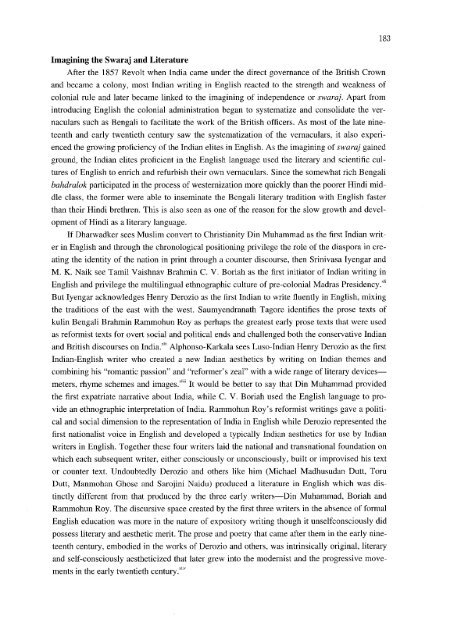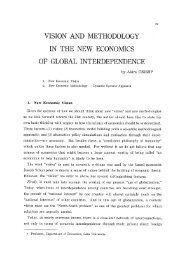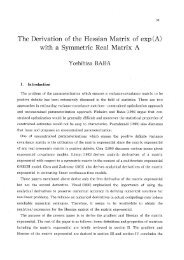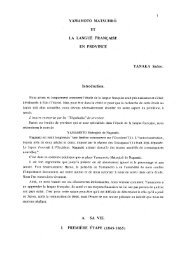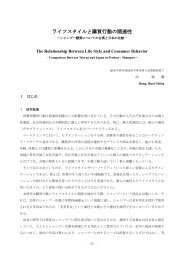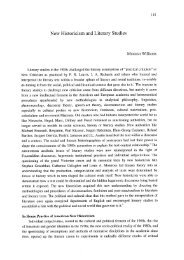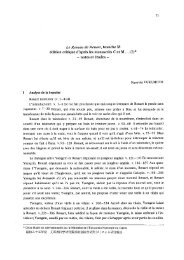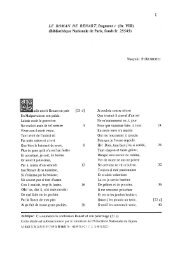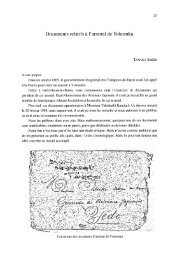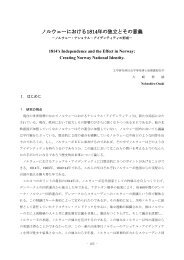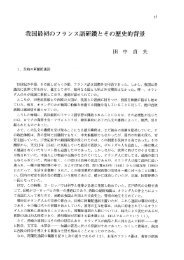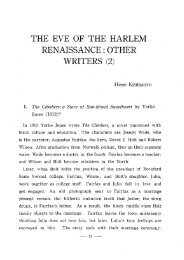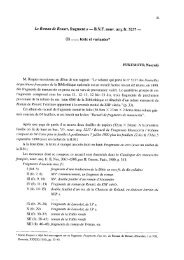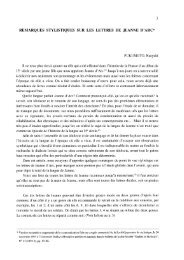Indian Writing in English 1794-2004 - Soka University Repository
Indian Writing in English 1794-2004 - Soka University Repository
Indian Writing in English 1794-2004 - Soka University Repository
Create successful ePaper yourself
Turn your PDF publications into a flip-book with our unique Google optimized e-Paper software.
Imag<strong>in</strong><strong>in</strong>g the Swaraj and Literature<br />
After the 1857 Revolt when India came under the direct governance of the British Crown<br />
and became a colony, most <strong>Indian</strong> writ<strong>in</strong>g <strong>in</strong> <strong>English</strong> reacted to the strength and weakness of<br />
colonial rule and later became l<strong>in</strong>ked to the imag<strong>in</strong><strong>in</strong>g of <strong>in</strong>dependence or swaraj. Apart from<br />
<strong>in</strong>troduc<strong>in</strong>g <strong>English</strong> the colonial adm<strong>in</strong>istration began to systematize and consolidate the ver-<br />
naculars such as Bengali to facilitate the work of the British officers. As most of the late n<strong>in</strong>e-<br />
teenth and early twentieth century saw the systematization of the vernaculars, it also experi-<br />
enced the grow<strong>in</strong>g proficiency of the <strong>Indian</strong> elites <strong>in</strong> <strong>English</strong>. As the imag<strong>in</strong><strong>in</strong>g of swaraj ga<strong>in</strong>ed<br />
ground, the <strong>Indian</strong> elites proficient <strong>in</strong> the <strong>English</strong> language used the literary and scientific cultures<br />
of <strong>English</strong> to enrich and refurbish their own vernaculars. S<strong>in</strong>ce the somewhat rich Bengali<br />
bandralok participated <strong>in</strong> the process of westernization more quickly than the poorer H<strong>in</strong>di mid-<br />
dle class, the former were able to <strong>in</strong>sem<strong>in</strong>ate the Bengali literary tradition with <strong>English</strong> faster<br />
than their H<strong>in</strong>di brethren. This is also seen as one of the reason for the slow growth and devel-<br />
opment of H<strong>in</strong>di as a literary language.<br />
If Dharwadker sees Muslim convert to Christianity D<strong>in</strong> Muhammad as the first <strong>Indian</strong> writ-<br />
er <strong>in</strong> <strong>English</strong> and through the chronological position<strong>in</strong>g privilege the role of the diaspora <strong>in</strong> cre-<br />
at<strong>in</strong>g the identity of the nation <strong>in</strong> pr<strong>in</strong>t through a counter discourse, then Sr<strong>in</strong>ivasa Iyengar and<br />
M. K. Naik see Tamil Vaishnav Brahm<strong>in</strong> C. V. Boriah as the first <strong>in</strong>itiator of <strong>Indian</strong> writ<strong>in</strong>g <strong>in</strong><br />
<strong>English</strong> and privilege the multil<strong>in</strong>gual ethnographic culture of pre-colonial Madras Presidency. di<br />
But Iyengar acknowledges Henry Derozio as the first <strong>Indian</strong> to write fluently <strong>in</strong> <strong>English</strong>, mix<strong>in</strong>g<br />
the traditions of the east with the west. Saumyendranath Tagore identifies the prose texts of<br />
kul<strong>in</strong> Bengali Brahm<strong>in</strong> Rammohun Roy as perhaps the greatest early prose texts that were used<br />
as reformist texts for overt social and political ends and challenged both the conservative <strong>Indian</strong><br />
and British discourses on India.X'" Alphonso-Karkala sees Luso-<strong>Indian</strong> Henry Derozio as the first<br />
<strong>Indian</strong>-<strong>English</strong> writer who created a new <strong>Indian</strong> aesthetics by writ<strong>in</strong>g on <strong>Indian</strong> themes and<br />
comb<strong>in</strong><strong>in</strong>g his "romantic passion" and "reformer's zeal" with a wide range of literary devices—<br />
meters, rhyme schemes and images."'1" It would be better to say that D<strong>in</strong> Muhammad provided<br />
the first expatriate narrative about India, while C. V. Boriah used the <strong>English</strong> language to pro-<br />
vide an ethnographic <strong>in</strong>terpretation of India. Rammohun Roy's reformist writ<strong>in</strong>gs gave a politi-<br />
cal and social dimension to the representation of India <strong>in</strong> <strong>English</strong> while Derozio represented the<br />
first nationalist voice <strong>in</strong> <strong>English</strong> and developed a typically <strong>Indian</strong> aesthetics for use by <strong>Indian</strong><br />
writers <strong>in</strong> <strong>English</strong>. Together these four writers laid the national and transnational foundation on<br />
which each subsequent writer, either consciously or unconsciously, built or improvised his text<br />
or counter text. Undoubtedly Derozio and others like him (Michael Madhusudan Dutt, Toru<br />
Dutt, Manmohan Ghose and Saroj<strong>in</strong>i Naidu) produced a literature <strong>in</strong> <strong>English</strong> which was dis-<br />
t<strong>in</strong>ctly different from that produced by the three early writers—D<strong>in</strong> Muhammad, Boriah and<br />
Rammohun Roy. The discursive space created by the first three writers <strong>in</strong> the absence of formal<br />
<strong>English</strong> education was more <strong>in</strong> the nature of expository writ<strong>in</strong>g though it unselfconsciously did<br />
possess literary and aesthetic merit. The prose and poetry that came after them <strong>in</strong> the early n<strong>in</strong>eteenth<br />
century, embodied <strong>in</strong> the works of Derozio and others, was <strong>in</strong>tr<strong>in</strong>sically orig<strong>in</strong>al, literary<br />
and self-consciously aestheticized that later grew <strong>in</strong>to the modernist and the progressive move-<br />
ments <strong>in</strong> the early twentieth century.X""<br />
183


